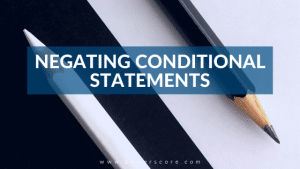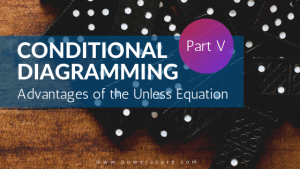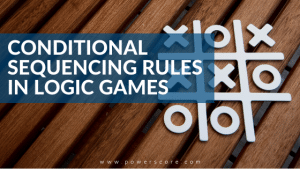Join Jon and Dave as they present the ultimate Logical Reasoning Knowledge Test: 20 questions covering the entirety of the LR section, each designed to measure your grasp on key concepts and fundamental principles. They begin with the 20-question quiz, then follow it up with detailed explanations of each item, explaining precisely how you should have answered and what any missteps tell you about your current LR skills. This is one of the most … [Read more...]
Search Results for: conditional reasoning
Podcast Episode 84: Causal Reasoning Part I – The Nature of Basic LSAT Causality
After several months of LSAT-Flex reviews and admissions cycle analysis, Jon and Dave are getting back to basics with a conceptual overview of causal reasoning. In this episode they examine precisely how LSAT causality operates, the central assumption that makes it so vulnerable, common points of confusion including correlations and conditionality, and the key distinctions between causation in premises and conclusions. If you’re looking for a … [Read more...]
The Most Dangerous Conditional Rule on the LSAT
On our LSAT Discussion Forum recently, I've been running into a recurrent question about a conditional reasoning rule. These questions revolve around a really tricky phrasing, one that has devastated test takers when it has appeared on previous LSATs. But if you can learn the idea, it takes something the test makers expect to be very difficult and turns it into something fairly easy. Plus, it's not that tough to learn! So what is this mysterious … [Read more...]
Approaching Logical Reasoning Sections Strategically
Approaching the LSAT Strategically Series: Part I, Part II, Part III There is a fundamental truth about test takers when it comes to the LSAT: everyone is different. That is, everyone who sits down with this exam will have unique strengths and weaknesses, likes and dislikes, and ultimately, ways they can optimize their performance in every section. While that certainly affects how it is that people prepare, I think it also dictates how test … [Read more...]
Conditionality vs. Causality: Similarities and Differences
Did you know that conditional reasoning and causal reasoning can be found in over 30% of Logical Reasoning stimuli on the average LSAT? That's right; they're two of the most frequently tested, and most frequently misinterpreted, reasoning techniques on the test! In today's LSAT Forum Post of the Day, PowerScore Senior Developer Jon Denning advises a student on exactly how to differentiate between these two concepts. In addition, he outlines … [Read more...]
Negating Compound and Conditional Statements
The ability to logically negate a statement—whether conditional, causal, etc.—is critical to your success on the LSAT. It comes up most commonly in the Logical Reasoning section of the test, although any question stem using the word “EXCEPT” (always capitalized) will require you to logically negate that stem. The list does not stop here. Every time you apply the contrapositive of a conditional statement, you will need to reverse and negate the … [Read more...]
Grouping Games, Conditional Linkage, and the Double-Not Arrow
A commonly-tested occurrence in Grouping Games (and even occasionally in Logical Reasoning) is a set of conditional rules that can be linked to one another through shared variables, forming chains and producing a series of inferences. The ability to create and manipulate these linkages is critical, as is the ability to avoid mistakes! In this LSAT Forum Post of the Day, PowerScore VP of Development Jon Denning walks a student through the … [Read more...]
Beware of Keywords in Logical Reasoning Questions
Bad advice appears well-justified and initially quite useful in solving a good number of questions. Unfortunately, shortcuts are easy to circumvent. What's worse, they can be used as traps—especially if you tend to use them blindly (as people often do). Let’s take a look at a common belief about Flaw in the Reasoning questions: If you come across a Flaw question where the stimulus contains conditional reasoning, the flaw has something to do with … [Read more...]
Negating Conditional Statements
Most Logical Reasoning questions with conditional reasoning won’t require you to negate the conditional relationships in them. You will certainly need to know what the contrapositive is, and—if there are multiple conditional relationships—you need to know how to form a conclusion by combining them into a chain (aka the “law of syllogism”). Occasionally, in Justify questions, you will need to establish a logical link between the premises and the … [Read more...]
Timing is (Almost) Everything When it Comes to Logical Reasoning
Keeping a good pace on the Logical Reasoning section is primarily a function of one’s conceptual understanding of the test. By “conceptual understanding,” we mean that simply knowing how to approach the most frequently appearing question types won’t suffice. Rather, you should practice solving each question type with over and over until your approach becomes more intuitive than deliberate. Conceptual Understanding in Practice For instance, you … [Read more...]
Studying GMAT Critical Reasoning? Consider Using LSAT LR Questions
Those of you who follow the PowerScore blog know that I most frequently write about the LSAT and law school related topics. However, PowerScore also offers GMAT books, so I spend time in the GMAT world as well. If you've ever studied the GMAT, you know that both the Critical Reasoning (CR) and Reading Comprehension (RC) sections of that test are very similar to the LSAT Logical Reasoning (LR) and Reading Comprehension sections. But whereas the … [Read more...]
Conditional Diagramming Part V: Advantages of the Unless Equation
Students often ask if there is an easier way to handle conditional statements containing necessary condition indicators such as “unless,” “except,” “until,” and “without.” The Unless EquationTM This is relatively simple, but it does involve a two-step process: Whatever term is modified by “unless” becomes the necessary condition. The remaining term is negated and becomes the sufficient condition. For example, consider the … [Read more...]
Conditional Diagramming Part IV: Working with “Only”
We are continuing our Conditional Diagramming discussion today with the word “only” which is used frequently in LSAT questions. “Only” is a necessary condition indicator, and its usage is often easy to parse. Here’s an example: Only doctors carry malpractice insurance. “Only” modifies “doctors,” and thus the proper diagram is: Carry malpractice insurance → doctor However, in a number of instances, “only” is used in a way that is more … [Read more...]
Conditional Sequencing Rules in Logic Games
We're now ten weeks away from the LSAT, which still gives you plenty of time to prepare and reach your goals, but the clock is certainly ticking--if you're waiting for your course to begin that's fine!; if you haven't thought about how you intend to prep, however, it's time to get going. And even though it's still fairly early I regularly hear from anxious test takers, and unsurprisingly Logic Games often weigh most heavily on their minds. I … [Read more...]
- « Previous Page
- 1
- 2
- 3
- 4
- …
- 6
- Next Page »











